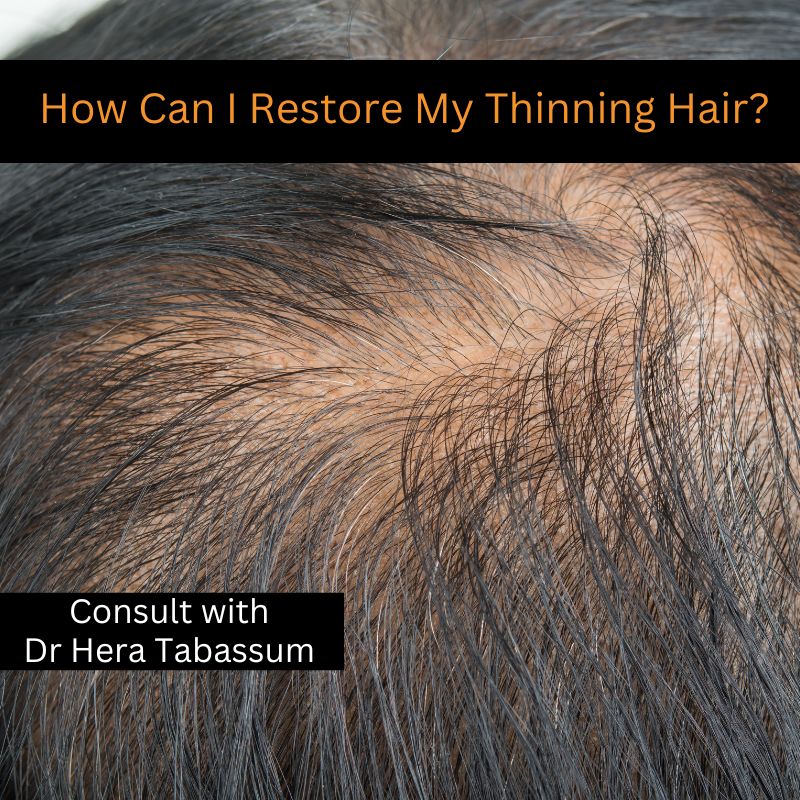For many people, hair thinning or loss can be an unpleasant event that affects their confidence and sense of self. Thankfully, there are a few methods that might help address hair thinning and encourage regeneration. Let us investigate several methods for reinstating thinning hair, ranging from alterations in lifestyle to medicinal measures.
Understanding Hair Thinning
Before delving into restoration methods, it’s essential to understand the common causes of hair thinning:
Genetics: Hereditary factors play a significant role in hair loss, with conditions like male pattern baldness and female pattern hair loss affecting both men and women.
Hormonal Changes: Hormonal imbalances due to factors such as pregnancy, menopause, or thyroid disorders can contribute to hair thinning.
Stress and Lifestyle: Chronic stress, poor nutrition, and certain lifestyle habits can disrupt the hair growth cycle, leading to increased shedding and thinning over time.
Medical Conditions: Conditions such as alopecia areata, scalp infections, and autoimmune disorders can cause hair loss and thinning.
Hair Restoration Strategies
Healthy Diet and Nutritional Supplements:
To sustain good hair development, a diet rich in necessary nutrients and well-balanced is essential. Hair health can be supported by including meals high in vitamins, minerals, and protein, such as leafy greens, eggs, salmon, and nuts. Furthermore, biotin, vitamin D, and omega-3 fatty acid-containing dietary supplements may support the development and thickness of hair.

Scalp Care and Hygiene:
Maintaining a healthy environment for hair follicles to develop requires proper scalp cleanliness. Frequent shampooing can help avoid clogged follicles and possible hair loss by removing excess oil, dirt, and product buildup with a mild, sulfate-free cleanser. Using essential oils such as rosemary or peppermint to massage the scalp can also increase blood flow and promote hair growth.
Medications and Topical Treatments:
Over-the-counter and prescription medications can be effective in treating certain types of hair loss. Minoxidil, commonly known as Rogaine, is a topical solution approved by the FDA for stimulating hair growth in both men and women. Finasteride, marketed as Propecia, is an oral medication that can help prevent further hair loss in men with male pattern baldness. Additionally, prescription-strength shampoos containing ingredients like ketoconazole or salicylic acid may help improve scalp health and promote thicker hair.
Hair Transplant Surgery:
A more long-term treatment is provided via hair transplant surgery for those with extensive hair loss. Hair follicles from scalp regions resistant to hair loss (donor site) are extracted and transplanted into balding or thinning areas (receiver site) during a hair transplant operation. Cutting-edge methods including follicular unit extraction (FUE) and transplantation (FUT) produce natural-looking results with little downtime and scarring.
Lifestyle Modifications:
Healthy lifestyle choices can have a favorable effect on the health and growth of hair. Stress-reduction methods such as yoga or meditation can help stop hair loss caused by stress. The thickness and integrity of hair can be preserved by minimizing damage and breakage through the avoidance of chemical treatments, tight hairstyles, and excessive heat styling.
Conclusion on Restore My Thinning Hair
A comprehensive strategy that targets the underlying reasons of thinning hair and encourages healthy scalp function and hair development is necessary for its restoration. Individuals can investigate a range of solutions, tailored to their specific requirements and preferences, ranging from dietary modifications and topical therapies to surgical operations. For individualized advice and suggestions on attaining thicker, fuller hair and regaining confidence, speak with a dermatologist or hair restoration specialist.
For more information consult with the best Dermatologist in Roorkee – Dr Hera Tabassum.
